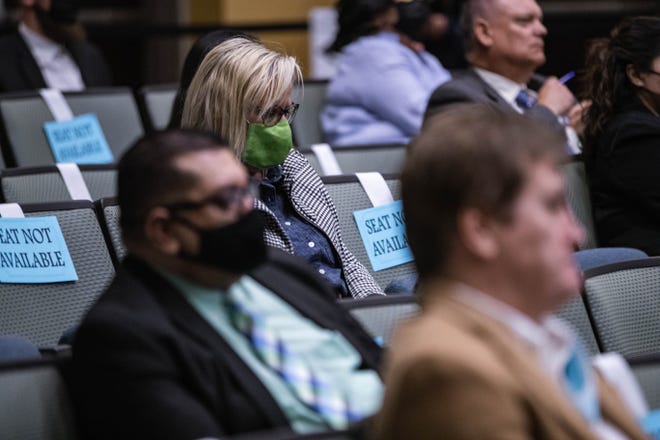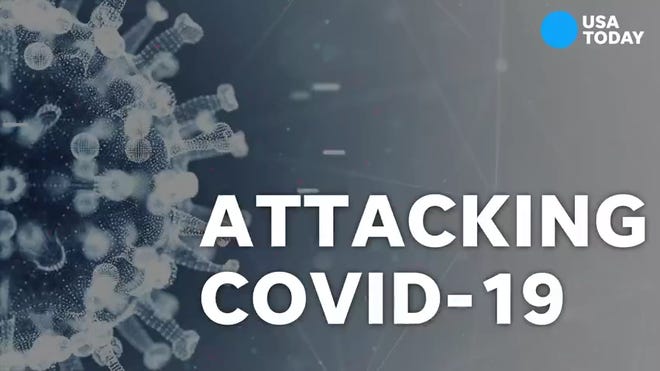LAS CRUCES – Six days after New Mexico’s governor announced an abrupt end to mandatory masking in most public indoor spaces, the state Department of Health addressed concerns from residents with compromised immunity, targeting those most vulnerable to infection with treatment options and advice.
Hospitalizations of COVID-19 patients statewide have fallen below 400, with just 351 reported Tuesday evening and 34 ICU beds available statewide Wednesday after an extended period of ICU scarcity. Daily case counts are dropping as well after the spread of the omicron variant peaked at the end of January, and as home tests (versus lab-verified samples) become more common.
The World Health Organization reported a 21 percent drop in cases globally during the past week.
Politics or data? Behind New Mexico’s decision to drop its mask

During a news conference Wednesday afternoon, state acting Health Secretary Dr. David Scrase fielded questions about the surprise announcement last week that mask mandates were mostly being dropped, saying he and Gov. Michelle Lujan Grisham were in regular communication about the state’s COVID-19 response.
Scrase said mask mandates, in the first place, were a measure to help cushion the blow on the state’s hospital system and preserve its resources. He said conditions at hospitals now permitted for the mandate to be safely dropped.
“The Department of Health intends to do what we do for the benefit of the most people at any given point of time,” Scrase said, adding: “The pandemic that we’re in now is a very different pandemic than we were in two years ago.”
COVID ‘toolkit’ for immunocompromised
The New Mexico Department of Health is recommending additional vaccine doses for those with severely compromised immunity, including transplant recipients and cancer patients undergoing active treatment. The recommendation aligns with advice from the Centers for Disease Control and Prevention. Fourth vaccine boosters for the broader public have not been authorized.
Additionally, the health department promoted antibody treatments, including newer treatments with longer-lasting effect.
A page on the state’s COVID-19 website presents additional information for such groups, located at https://cv.nmhealth.org/extra-protection/.

Home testing kits are available to New Mexico households free and the department recommended ordering them via http://FindaTestNM.org and keeping a few at hand so that positive cases can be determined early enough to seek outpatient oral treatments.
The department also recommended continued masking, with well-fitting KN95 or N95 masks, among immunocompromised people or those with chronic health illnesses as well as their caregivers.
Masks are still required in hospitals and certain healthcare and congregate settings — like nursing homes, jails and prisons — as well as areas under federal masking rules including transportation. Businesses, school districts and local government facilities are also free to institute their own mask requirements.
“Masks are just as effective now as they were two weeks ago,” Scrase said, pointing out that he continues to wear one himself in public, in consideration of his age and exposure to other people. During the Feb. 18 announcement by the governor that the mask mandate was being dropped, he removed his mask as did some other state officials and lawmakers in the governor’s office in Santa Fe.

On Wednesday Scrase repeatedly urged New Mexicans to exercise compassion and patience over other individuals’ choices, and to be “more curious and less accusatory” when discussing the topic.
Who is ‘moderately or severely immunocompromised?’
Per the state health department, New Mexicans are considered moderately or severely immunocompromised under the following conditions:
- Undergoing chemotherapy or radiation treatment for tumors or blood cancers;
- Taking anti-rejection medication following an organ transplant;
- Having received a stem cell transplant within the last two years;
- Diagnosed with a primary immunodeficiency syndrome (e.g., DiGeorge syndrome or Wiskot-Aldrich syndrome);
- Are positive for advanced or untreated HIV infection;
- Taking high-dose corticosteroids such as 20 mg of prednisone daily or certain other medications;
- Possibly other immune-suppressing medications.
The health department recommends individuals speak with their provider or call the state COVID-19 hotline (1-855-600-3453, option 3) for further guidance on medications and eligibility for a fourth dose.
Scrase said the department has begun communicating by text message to individuals who reported they had these conditions when they registered for COVID-19 vaccines to encourage them to boost their protections and advise them of options.
He also said he expected the SARS-CoV-2 coronavirus, which causes COVID-19 disease, to produce more variants of concern as it evolves, perhaps as soon as June.
“The virus itself has not yet surrendered,” he said, “so I am assuming we will see another big wave.”
Algernon D’Ammassa can be reached at 575-541-5451, adammassa@lcsun-news.com or @AlgernonWrites on Twitter.
Keep reading:

